Memories of Murder opens in a ponderous mood as a small town detective named Park Doo-Man (played by Mr. Vengeance himself Kang-ho Song) discovers the body of a murdered girl stuffed into a stone partition of a ditch. Her hands are bound and her mouth gagged; she will soon be joined by many more.
The year is 1986 and South Korea’s police force is ultimately ill equipped to deal with the onslaught they are about to face.
Giving a plot summary would be both crippling dull, pointless and would probably ruin the movie for people so instead I am just going to talk about the way the movie works with reference to whatever scenes come to mind.
Original Park Chan-wook was going to make Memories of Murder and Joon-ho Bong was going to film Oldboy. And while it would be easy to see how the directors could have adapted the films, Memories is in a lot of ways very similar to Sympathy for Mr. Vengeance while Oldboy is stylistically much closer to Joon-ho Bong’s earlier film Barking Dogs Never Bite.
If the directors had continued in this vein we would have wound up with two excellent films, as it was the swapping of material produced two of the finest films to ever come out of Korea and arguably two of the finest films of this century.
In a lot of ways Memories of Murder is an attack on the brutal way that the police dealt the murder suspects. What Joon-ho Bong does which cements this film as a classic is make the three lead police officers deeply flawed individuals who have moments of incredible charm and incredible cruelty.
Detective Park is a man who allows a mentally challenged boy to get beaten up by his subordinate, tries to frame said boy, and attempts to beat the confession out of another innocent suspect. And yet the other elements of his character make him seem ultimately conflicted. What is more interesting is the descent of the more rational Detective Seo Tae-Yoon a police officer from Seoul, who is at first the only member of the team willing to use scientific method and whom saves two of the suspects from wrongful imprisonment.
As the case goes on and more women are found dead with increasingly bizarre twists on the murder’s modus operandi, including segments of peach, pencils and corsets, the younger detective finds himself becoming more and more like those he looks down upon convincing himself that one suspect is the killer no matter what the evidence says.
What makes Memories of Murder so special is that most serial killer films serve a near fetishistic function in that they lionise the killer. No matter how much of a bastard he is there is an undoubted pleasure in waiting to see how the killer will elude the cops and what he will do next.
Memories of Murder has none of this, each and every death has a meaning and the killer himself is a character to be feared and loathed. In fact the refusal of the film to name the killer, seen as the film is based on a real life unsolved crime it’s the only way it could be done, he retains a shadow like quality.
The film is visually stunning and once again highlights a distinctive talent for cinematography that even the most mundane Korean directors seem blessed with. It is a hauntingly beautiful set off by an evocative score, a genuine sense of dread and characters who are imperfect but utterly compelling.
All reviews -
Movies (49)
Memories of Murder review
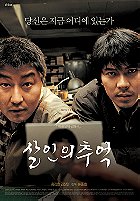 Posted : 14 years, 3 months ago on 20 March 2011 08:46
(A review of Memories of Murder)
Posted : 14 years, 3 months ago on 20 March 2011 08:46
(A review of Memories of Murder) 0 comments, Reply to this entry
0 comments, Reply to this entry
The Adjustment Bureau review
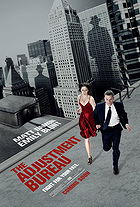 Posted : 14 years, 4 months ago on 4 March 2011 09:46
(A review of The Adjustment Bureau)
Posted : 14 years, 4 months ago on 4 March 2011 09:46
(A review of The Adjustment Bureau)This is pretty much a stealth Romance, but it really, really works. Damon and Blunt are great as the two romantic leads and Blunt in particular is all kinds of funny. They've got a lot of chemistry which helps because their relationship is both core to the central plot of the film and kind of underdeveloped. They're essentially destined to be together and their chemistry and interaction really kind of sells that. Matt Damon does a lot with a very, very, malnourished role bringing a certain charm and integrity to what could be a cipher.
John Slattery is essentially playing Roger Sterling with godlike powers but he's a lot of fun in the role and nice counterpoint to Damon and Blunt. He's unfortunately replaced halfway through and his replacement should be awesome, but never really gels. The action sequences are really well done, just lots of energy and lots of great little moments. It's more of a thriller than anything else, but there are two chases which make great use of the Bureau's ability to traverse geography.
The ending almost kills the film, because it just sort of happens and you're kind of left wanting more. Still it's a very solid directorial debut, lots of great touches and lots of heft to the action. It's not a great film, but it's a good, fun, film buoyed by two great central performances and a few fun supporting characters.
Thomas Newman's score is very good as well.
John Slattery is essentially playing Roger Sterling with godlike powers but he's a lot of fun in the role and nice counterpoint to Damon and Blunt. He's unfortunately replaced halfway through and his replacement should be awesome, but never really gels. The action sequences are really well done, just lots of energy and lots of great little moments. It's more of a thriller than anything else, but there are two chases which make great use of the Bureau's ability to traverse geography.
The ending almost kills the film, because it just sort of happens and you're kind of left wanting more. Still it's a very solid directorial debut, lots of great touches and lots of heft to the action. It's not a great film, but it's a good, fun, film buoyed by two great central performances and a few fun supporting characters.
Thomas Newman's score is very good as well.
 0 comments, Reply to this entry
0 comments, Reply to this entry
No Country for Old Men review
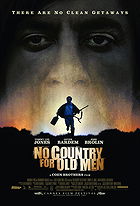 Posted : 14 years, 4 months ago on 20 February 2011 06:18
(A review of No Country for Old Men)
Posted : 14 years, 4 months ago on 20 February 2011 06:18
(A review of No Country for Old Men)No Country For Old Men is something of an oddity when it comes to Academy Award winners. Violent films have won Oscars before (The Departed’s win the year before confirms this) but the recently the Oscars have favoured either the lavish or the ‘important’. No Country For Old Men is certainly not a lavish film and its importance is shrouded in the tonality of a traditional thriller and yet it managed to beat off competition from far more Oscar suitable candidates to win its Best Picture award. I think more than anything else my shock at No Country For Old Men’s victory comes from the Academy Awards rewarding a film I legitimately liked. Usually films I like don’t make the Oscar shortlist or are snubbed in favour of more ‘Oscar Friendly’ fare. I certainly have more favourite films that were also rans (Lost In Translation, Gosford Park, The Insider, Secrets and Lies, LA Confidential, Fargo are all good recent examples) than actual winners.
But even amongst the films that I absolutely loved last year No Country For Old Men seemed like the least likely to win an Oscar. Certainly compared to the likes of The Assassination of Jesse James, Zodiac and There Will Be Blood, No Country For Old Men seemed far too unorthodox to even get short listed. The fact that only No Country For Old Men and There Will Be Blood got short listed goes a long way to demonstrating my lack of insight vis-à-vis the Academy Awards. If this is starting to sound like I don’t like the film then that was not my intention, No Country For Old Men is probably one of my favourite films of last year and my surprise comes merely from its recognition as a truly great piece of cinema.
Part of my love for the film comes from the fact that despite the Coen Brothers making some of my favourite films of the 1990s, I’d been having trouble connecting with their work since The Man Who Wasn’t There. The dour noir homage was a very nifty piece of filmmaking, clever and buoyed by a fantastic central performance by Billy Bob Thornton. Intolerable Cruelty would be a comedy that barely made me smile and The Ladykillers despite an energetic performance from Tom Hanks would prove to be the first film by the Coens that I actually thought wasn’t very good. Still their decision to adapt Cormac McCarthy’s No Country For Old Men had me very excited, McCarthy’s lean and punishing prose the perfect way to reenergise a pair of directors who seemed to be finally letting the bloat sink in.
Tommy Lee Jones and Javier Bardem are our first focal points in No Country For Old Men. Jones’ Sheriff Ed-Tom Bell provides an opening narration as Bardem’s Anton Chigurh establishes himself as a man with whom not to fuck. These two characters are the central core of the film, representing the old man whose morality is no longer in line with an ever changing world and the vicious embodiment of change. In my view No Country For Old Men is about the morality that people live by, the code and rules of conduct we engage in everyday. The film is about how that code can become untenable as the world around you changes. But it is not a film about how the modern world is becoming increasingly vicious, one of the final conversations in the film shows the world has always been this way, but about how people can become outdated or lost when their own code fails them.
Llewellyn Moss extrapolates on this by choosing to enter a world he cannot hope to survive in, and the majority of No Country For Old Men’s narrative follows his attempts to survive after taking a satchel of money from a botched drug exchange. Even from our first glimpse of Moss, played by the increasingly great Josh Brolin, we understand that he could never hope to survive when squared off with the darkness represented by Chigurh. His first line is even an echo of Chigurh, whereas Moss asks a deer to stay still as he lines up a shot (and promptly misses his intended kill shot) Chigurh asks an innocent bystander to stay still moments before casually executing him with a compressed air gun. This brief moment of duality tells us a lot about the way the film is going to proceed and also sets up the way that Chigurh approaches his victims, cattle for slaying.
Centred largely on Anton Chigurh the few scenes of violence in the film are so brutal, so honest, and so nasty and mean that it creates a palpable sense of dread and unease. Chigurh becomes more than a man in the film; he becomes an ethos, an unrelenting force which destroys everything in its path on general principal. Played pitch perfectly by Bardem, Chigurh is a truly threatening and intimidating force on the screen. Fearless, ruthless and cold blooded. We are given rare insight into his method, scenes which show the careful planning required for his flawless attacks, and it just makes him even scarier. There is just something unnerving about his planning and his innate ability which makes every scene with him in unbearably tense and every scene without him creates nagging doubts and fears that he might just be around the corner.
It’s a testament to the deliberate tone of the film that Chigurh is never allowed to become ‘badass’, in the hands of lesser directors the character could consume the film in a negative way. As it is even when he’s employing cool pieces of weaponry (No Country marks the first time I’ve ever seen a silenced shotgun and it’s a fucking marvellous piece of kit, terrifying but marvellous) you’re still never cheering for or getting excited by the violence. You just want it to stop, which isn’t to say the film is totally joyless. It’s a hard film, but there is the trademark Coen wit. The humour’s there it’s just blacker than a moonless night. From remarks about dead dogs to the dry way Sheriff Bell tells the story of a cattle owner who is paralyzed when trying to kill a steer. But the humour is often incidental to the main story which skirts on the tonal edge of bleak and finds a home in brutal.
When Moss stumbles across a botched drug deal and promptly steals a satchel containing a few million dollars he enters a world his ethical code cannot hope to survive in. His going back to give a survivor some water just proves the point of his inability to live in this new dangerous world. As such his flight from Chigurh and a bunch of pissed off Mexicans is really nothing but the thrashing of an already strung up man, his death is unavoidable and all he can hope to do is prolong the inevitable. Indeed just to stay alive requires Moss to be ever vigil and his one lapse in concentration ultimately leads to his inglorious end. Despite how careful he is, despite how much of a fighter he is, Moss just doesn’t have the ethics or immorality to survive.
Much has been said about the end of No Country For Old Men and the way that Moss’s death is dealt with. Certainly following an earlier confrontation the audience assumes that Moss will be killed by Anton Chigurh. Stalking his prey across the country and leaving a trail of death in his wake, Chigurh represents an archetypal antagonist and his lack of involvement in Moss’s final moments was a point of contention amongst my friends. But having Moss fall at the hands of Chigurh would give credence to the character; he would no longer be one of the cattle. Having him be killed off-screen by an unknown Mexican assailant once again demonstrates how unprepared Moss is for the world he has found himself in.
The final section of No Country For Old Men just focuses back on the codes that the three characters use to govern their lives. Moss finally meets the end that had been looming since he set eyes on the money, Sheriff Bell realises that his code is just untenable and gives up thus securing his survival, whilst Chigurh is punished for an infraction of his own code. Anton Chigurh’s final scene takes place at the home of Llewellyn Moss’ widow Carla Jean. Previously in the film he spared a gas attendants life after his quarry won a coin toss. He offers this same deal to Carla Jean who promptly refuses to put her life into the outcome of a coin toss. Chigurh is forced to kill her without the coin flip and this infraction leads to his being hit by a car as he drives away from the scene. Whilst the accident isn’t fatal it hammers home the tonality of the film, that even a minor deviation from the codes and ethics we live our life by can result in catastrophe.
But even amongst the films that I absolutely loved last year No Country For Old Men seemed like the least likely to win an Oscar. Certainly compared to the likes of The Assassination of Jesse James, Zodiac and There Will Be Blood, No Country For Old Men seemed far too unorthodox to even get short listed. The fact that only No Country For Old Men and There Will Be Blood got short listed goes a long way to demonstrating my lack of insight vis-à-vis the Academy Awards. If this is starting to sound like I don’t like the film then that was not my intention, No Country For Old Men is probably one of my favourite films of last year and my surprise comes merely from its recognition as a truly great piece of cinema.
Part of my love for the film comes from the fact that despite the Coen Brothers making some of my favourite films of the 1990s, I’d been having trouble connecting with their work since The Man Who Wasn’t There. The dour noir homage was a very nifty piece of filmmaking, clever and buoyed by a fantastic central performance by Billy Bob Thornton. Intolerable Cruelty would be a comedy that barely made me smile and The Ladykillers despite an energetic performance from Tom Hanks would prove to be the first film by the Coens that I actually thought wasn’t very good. Still their decision to adapt Cormac McCarthy’s No Country For Old Men had me very excited, McCarthy’s lean and punishing prose the perfect way to reenergise a pair of directors who seemed to be finally letting the bloat sink in.
Tommy Lee Jones and Javier Bardem are our first focal points in No Country For Old Men. Jones’ Sheriff Ed-Tom Bell provides an opening narration as Bardem’s Anton Chigurh establishes himself as a man with whom not to fuck. These two characters are the central core of the film, representing the old man whose morality is no longer in line with an ever changing world and the vicious embodiment of change. In my view No Country For Old Men is about the morality that people live by, the code and rules of conduct we engage in everyday. The film is about how that code can become untenable as the world around you changes. But it is not a film about how the modern world is becoming increasingly vicious, one of the final conversations in the film shows the world has always been this way, but about how people can become outdated or lost when their own code fails them.
Llewellyn Moss extrapolates on this by choosing to enter a world he cannot hope to survive in, and the majority of No Country For Old Men’s narrative follows his attempts to survive after taking a satchel of money from a botched drug exchange. Even from our first glimpse of Moss, played by the increasingly great Josh Brolin, we understand that he could never hope to survive when squared off with the darkness represented by Chigurh. His first line is even an echo of Chigurh, whereas Moss asks a deer to stay still as he lines up a shot (and promptly misses his intended kill shot) Chigurh asks an innocent bystander to stay still moments before casually executing him with a compressed air gun. This brief moment of duality tells us a lot about the way the film is going to proceed and also sets up the way that Chigurh approaches his victims, cattle for slaying.
Centred largely on Anton Chigurh the few scenes of violence in the film are so brutal, so honest, and so nasty and mean that it creates a palpable sense of dread and unease. Chigurh becomes more than a man in the film; he becomes an ethos, an unrelenting force which destroys everything in its path on general principal. Played pitch perfectly by Bardem, Chigurh is a truly threatening and intimidating force on the screen. Fearless, ruthless and cold blooded. We are given rare insight into his method, scenes which show the careful planning required for his flawless attacks, and it just makes him even scarier. There is just something unnerving about his planning and his innate ability which makes every scene with him in unbearably tense and every scene without him creates nagging doubts and fears that he might just be around the corner.
It’s a testament to the deliberate tone of the film that Chigurh is never allowed to become ‘badass’, in the hands of lesser directors the character could consume the film in a negative way. As it is even when he’s employing cool pieces of weaponry (No Country marks the first time I’ve ever seen a silenced shotgun and it’s a fucking marvellous piece of kit, terrifying but marvellous) you’re still never cheering for or getting excited by the violence. You just want it to stop, which isn’t to say the film is totally joyless. It’s a hard film, but there is the trademark Coen wit. The humour’s there it’s just blacker than a moonless night. From remarks about dead dogs to the dry way Sheriff Bell tells the story of a cattle owner who is paralyzed when trying to kill a steer. But the humour is often incidental to the main story which skirts on the tonal edge of bleak and finds a home in brutal.
When Moss stumbles across a botched drug deal and promptly steals a satchel containing a few million dollars he enters a world his ethical code cannot hope to survive in. His going back to give a survivor some water just proves the point of his inability to live in this new dangerous world. As such his flight from Chigurh and a bunch of pissed off Mexicans is really nothing but the thrashing of an already strung up man, his death is unavoidable and all he can hope to do is prolong the inevitable. Indeed just to stay alive requires Moss to be ever vigil and his one lapse in concentration ultimately leads to his inglorious end. Despite how careful he is, despite how much of a fighter he is, Moss just doesn’t have the ethics or immorality to survive.
Much has been said about the end of No Country For Old Men and the way that Moss’s death is dealt with. Certainly following an earlier confrontation the audience assumes that Moss will be killed by Anton Chigurh. Stalking his prey across the country and leaving a trail of death in his wake, Chigurh represents an archetypal antagonist and his lack of involvement in Moss’s final moments was a point of contention amongst my friends. But having Moss fall at the hands of Chigurh would give credence to the character; he would no longer be one of the cattle. Having him be killed off-screen by an unknown Mexican assailant once again demonstrates how unprepared Moss is for the world he has found himself in.
The final section of No Country For Old Men just focuses back on the codes that the three characters use to govern their lives. Moss finally meets the end that had been looming since he set eyes on the money, Sheriff Bell realises that his code is just untenable and gives up thus securing his survival, whilst Chigurh is punished for an infraction of his own code. Anton Chigurh’s final scene takes place at the home of Llewellyn Moss’ widow Carla Jean. Previously in the film he spared a gas attendants life after his quarry won a coin toss. He offers this same deal to Carla Jean who promptly refuses to put her life into the outcome of a coin toss. Chigurh is forced to kill her without the coin flip and this infraction leads to his being hit by a car as he drives away from the scene. Whilst the accident isn’t fatal it hammers home the tonality of the film, that even a minor deviation from the codes and ethics we live our life by can result in catastrophe.
 0 comments, Reply to this entry
0 comments, Reply to this entry
Paul review
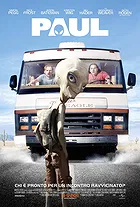 Posted : 14 years, 4 months ago on 14 February 2011 09:24
(A review of Paul)
Posted : 14 years, 4 months ago on 14 February 2011 09:24
(A review of Paul)I wasn't expecting to like this, but it's actually really, really, really, good. The first act feels really insubstantial, but it's all set up for what happens next. Lots of call backs, lots of echoing of jokes, one really funny running gag. Seth Rogen is the MVP of the film, he just brings a charm and personality to the role which really helps sell the film. Pegg and Frost are great but they kind of switch roles here, with Pegg being the dimmer, more amiable, of the two. Pegg doesn't really have much to do in the film and even though he get's a bunch of screen time it never particularly leads to anything. It's definitely more of an ensemble piece, in fact the stands out for me were probably Kristen Wiig and Bill Hader. Wiig is just consistently hilarious as the romantic lead in the film, whilst Bill Hader gets probably my favourite line in the entire film.
The third act is the strongest, although I think people might have an issue with how compressed and actiony it gets. The entire film up until that point is setup for the last twenty minutes and to me they work like gang busters. It's consistently funny and surprisingly well set up, considering it's an extended action sequence at the tail end of a fairly amiable comedy.
I think geek audiences might get more out of the film than others, but also might be harder on the film than others. It really wears it's references and influences on its sleeves and there are a ton of references to the work of Steven Spielberg and sci-fi films in general.
The third act is the strongest, although I think people might have an issue with how compressed and actiony it gets. The entire film up until that point is setup for the last twenty minutes and to me they work like gang busters. It's consistently funny and surprisingly well set up, considering it's an extended action sequence at the tail end of a fairly amiable comedy.
I think geek audiences might get more out of the film than others, but also might be harder on the film than others. It really wears it's references and influences on its sleeves and there are a ton of references to the work of Steven Spielberg and sci-fi films in general.
 0 comments, Reply to this entry
0 comments, Reply to this entry
There Will Be Blood review
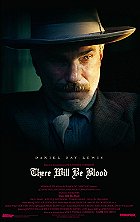 Posted : 14 years, 4 months ago on 13 February 2011 01:43
(A review of There Will Be Blood)
Posted : 14 years, 4 months ago on 13 February 2011 01:43
(A review of There Will Be Blood)Daniel Plainview watches as his oil derrick burns to the ground, a natural gas eruption costing his son the use of his ears and setting back his operation. As thick smoke turns night to day and panic sweeps the site, he kneels enraptured by the flame. The shot turns and shows Plainview in utter darkness, nothing distinguishable save for the glow of flame on his face. The object of his desire, his singular focus in life, giving him his only presence in the shot, giving him presence in the world. It is an incredible piece of economical filmmaking, a singular shot explaining all you need to know about the central character of There Will Be Blood.
Plainview actually explains this later on, in his grandstanding speech with his brother, and it is a rare example of the film overstating a situation. Daniel Day-Lewis gives Plainview so much as an actor in his portrayal of Plainview that a verbal explanation of his traits seems to be almost handholding. Plainview is a creature of instinct, animalistic and dangerous, who hides behind a well honed façade. He’s a primal character and as such grand declarations of psychoanalysis don’t really sit well with the character. As such the performance is based around very physical traits and Anderson plays to this at numerous times.
The silent opening ten minutes tell you a lot about Plainview, about his mindset and determination and how dangerous he is. Plainview is a character we can understand effortlessly, partially because of how nuanced the performance is and partially because he is a representation of something primal and twisted within most men. What makes Plainview magnetic is how human he is in his inhumanity, his goals and ambitions as presented onscreen are monstrous but they’re also believable. There’s an innate truth to the character which makes him exceptionally easy to accept.
Plainview’s rival in the film, the young preacher Eli Sunday, is a character who will be most disassociated from the audience. He faces a natural disadvantage in that There Will Be Blood is ostensibly Plainview’s story (if I remember correctly Plainview is only actually absent from one or two scenes in the entire film) so he has a dominant amount of screen time. As such despite the fact that both men are manipulators (Plainview’s sweet-talk to buy land and Eli’s spiritual healing and communion with god) only Plainview is shown away from his façade. The film is entirely about Plainview, the Jonny Greenwood’s incredible soundtrack even seems to score Plainview’s state of mind rather than the onscreen action, and as such Eli is little more than context to that character.
When I say Eli is context to Plainview I don’t mean to disparage the character, it is just that the way he is constructed and portrayed is more about setting up a mirror to Plainview and drawing out his emotions than presenting the story of the Sunday family. Eli is a character who thinks he can play the game, who thinks he has enough sway to manipulate the situation to his liking. In a way the movie charts how this belief in his own abilities and his inexperience with what he is dabbling in ultimately destroys Eli, both psychically and philosophically (with Plainview quenching Eli’s faith moments before seeking a more hands on resolution).
In a lot of ways Eli represents an intellectual counterpoint to Plainview’s intuitive nature. Eli thinks he can outsmart Plainview, and his few acts of attrition are all mental attacks. In doing so he underestimates Plainview’s resolve and underlying intelligence. Plainview is animalistic, but his façade is developed enough to allow him to match Eli at every turn. His final brutish actions being interspersed with the conniving wordplay and dramatics that were once Eli’s trade. More than anything Eli is desperate to be accepted by people, who want to prove his superiority to and be better than his peers. Plainview in contrast is a character who wants to isolate himself, who is willing to deal with people only as long he has too.
By stepping into Plainview’s home, Eli sacrifices the one advantage he had. In the outside world Plainview had to maintain pretence of humanity, hidden in his own home he is allowed to be the beast that is hinted at throughout the film. Plainview, with no profit to be gained from maintaining his persona, destroys Eli utterly. Taunting the preacher, mimicking his church performances with crazed fits and gaudy sermonizing, before beating him to death.
Plainview actually explains this later on, in his grandstanding speech with his brother, and it is a rare example of the film overstating a situation. Daniel Day-Lewis gives Plainview so much as an actor in his portrayal of Plainview that a verbal explanation of his traits seems to be almost handholding. Plainview is a creature of instinct, animalistic and dangerous, who hides behind a well honed façade. He’s a primal character and as such grand declarations of psychoanalysis don’t really sit well with the character. As such the performance is based around very physical traits and Anderson plays to this at numerous times.
The silent opening ten minutes tell you a lot about Plainview, about his mindset and determination and how dangerous he is. Plainview is a character we can understand effortlessly, partially because of how nuanced the performance is and partially because he is a representation of something primal and twisted within most men. What makes Plainview magnetic is how human he is in his inhumanity, his goals and ambitions as presented onscreen are monstrous but they’re also believable. There’s an innate truth to the character which makes him exceptionally easy to accept.
Plainview’s rival in the film, the young preacher Eli Sunday, is a character who will be most disassociated from the audience. He faces a natural disadvantage in that There Will Be Blood is ostensibly Plainview’s story (if I remember correctly Plainview is only actually absent from one or two scenes in the entire film) so he has a dominant amount of screen time. As such despite the fact that both men are manipulators (Plainview’s sweet-talk to buy land and Eli’s spiritual healing and communion with god) only Plainview is shown away from his façade. The film is entirely about Plainview, the Jonny Greenwood’s incredible soundtrack even seems to score Plainview’s state of mind rather than the onscreen action, and as such Eli is little more than context to that character.
When I say Eli is context to Plainview I don’t mean to disparage the character, it is just that the way he is constructed and portrayed is more about setting up a mirror to Plainview and drawing out his emotions than presenting the story of the Sunday family. Eli is a character who thinks he can play the game, who thinks he has enough sway to manipulate the situation to his liking. In a way the movie charts how this belief in his own abilities and his inexperience with what he is dabbling in ultimately destroys Eli, both psychically and philosophically (with Plainview quenching Eli’s faith moments before seeking a more hands on resolution).
In a lot of ways Eli represents an intellectual counterpoint to Plainview’s intuitive nature. Eli thinks he can outsmart Plainview, and his few acts of attrition are all mental attacks. In doing so he underestimates Plainview’s resolve and underlying intelligence. Plainview is animalistic, but his façade is developed enough to allow him to match Eli at every turn. His final brutish actions being interspersed with the conniving wordplay and dramatics that were once Eli’s trade. More than anything Eli is desperate to be accepted by people, who want to prove his superiority to and be better than his peers. Plainview in contrast is a character who wants to isolate himself, who is willing to deal with people only as long he has too.
By stepping into Plainview’s home, Eli sacrifices the one advantage he had. In the outside world Plainview had to maintain pretence of humanity, hidden in his own home he is allowed to be the beast that is hinted at throughout the film. Plainview, with no profit to be gained from maintaining his persona, destroys Eli utterly. Taunting the preacher, mimicking his church performances with crazed fits and gaudy sermonizing, before beating him to death.
 0 comments, Reply to this entry
0 comments, Reply to this entry
The Way Back review
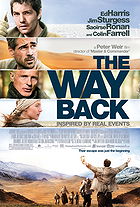 Posted : 14 years, 5 months ago on 24 January 2011 10:47
(A review of The Way Back)
Posted : 14 years, 5 months ago on 24 January 2011 10:47
(A review of The Way Back)Halfway through the film I was getting worried that this might be the worst misstep Weir, a personal favourite director of mine, had made. At the end of the film despite a few misgivings I'd rank this up there with the best of his work. It's definitely better than FEARLESS at least.
The problem is that the first half is just twitchy and rushed feeling. Despite the plot being relatively simple and being the sort of thing that would favour lots of character development the film feels populated by ciphers. Essentially the film is about a bunch of political (and non-political) prisoners escaping from a Gulag in Siberia in 1939 and walking to India. However the film only really comes alive and makes you feel for these characters after we've spent at least two thirds of the film with them. The problem is that the editing murders the film at times, scenes just going on a second too long and not really connecting with what went before or what goes after. Essentially the first hour of the film feels like it has no connective tissue and as such the ardous trek through Russia feels airless and weightless. You don't get a sense of time or place and whilst Weir films the vistas of Siberia with great aplomb the panoramas ultimately outweigh the cast.
The cast is injected with life by the late arrival of Saoirse Ronan who breathes life into the film and wakes Ed Harris from the hypnotic stupor he's in for the first hour. Ronan gives a sense of warmth and community to the group and it's through her that we start to actually, y'know, like the people we're following. Which is good because the second half is almost completely reliant on you rooting for these guys as they go through hell after hell to finish their journey.
Ronan's reinvogaration of the cast really helps the film storm from a limp to a sprint.
The problem is that the first half is just twitchy and rushed feeling. Despite the plot being relatively simple and being the sort of thing that would favour lots of character development the film feels populated by ciphers. Essentially the film is about a bunch of political (and non-political) prisoners escaping from a Gulag in Siberia in 1939 and walking to India. However the film only really comes alive and makes you feel for these characters after we've spent at least two thirds of the film with them. The problem is that the editing murders the film at times, scenes just going on a second too long and not really connecting with what went before or what goes after. Essentially the first hour of the film feels like it has no connective tissue and as such the ardous trek through Russia feels airless and weightless. You don't get a sense of time or place and whilst Weir films the vistas of Siberia with great aplomb the panoramas ultimately outweigh the cast.
The cast is injected with life by the late arrival of Saoirse Ronan who breathes life into the film and wakes Ed Harris from the hypnotic stupor he's in for the first hour. Ronan gives a sense of warmth and community to the group and it's through her that we start to actually, y'know, like the people we're following. Which is good because the second half is almost completely reliant on you rooting for these guys as they go through hell after hell to finish their journey.
Ronan's reinvogaration of the cast really helps the film storm from a limp to a sprint.
 0 comments, Reply to this entry
0 comments, Reply to this entry
The Ghost Writer review
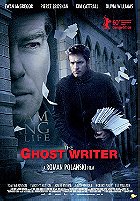 Posted : 14 years, 5 months ago on 24 January 2011 10:46
(A review of The Ghost Writer)
Posted : 14 years, 5 months ago on 24 January 2011 10:46
(A review of The Ghost Writer)A fantastically tense thriller. Does amazing work building up tension without any real action and is a great showcase for Ewan McGreggor, Pierce Brosnan and Olivia Williams. It's nice seeing McGreggor with a decent script again and it's probably one of his finest roles since his work with Boyle. Brosnan meanwhile brings a frustrated tension to his character, portraying Lang like a trapped animal.
With an amazing score, some beautiful cinematography and a fantastic final fifteen minutes this is probably one of the best thrillers in a while.
With an amazing score, some beautiful cinematography and a fantastic final fifteen minutes this is probably one of the best thrillers in a while.
 0 comments, Reply to this entry
0 comments, Reply to this entry
Road to Perdition review
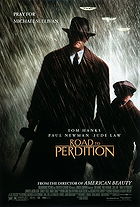 Posted : 14 years, 5 months ago on 24 January 2011 10:46
(A review of Road to Perdition)
Posted : 14 years, 5 months ago on 24 January 2011 10:46
(A review of Road to Perdition)Sam Mendes and Conrad Hall build this amazing, captivating, emotive world and then don’t find anything to do in it. Some great performances from Newman, Craig and Hanks almost distract from the languid pacing.
Thematically it’s a very slight film which would sing if it was a little shorter, as it is the pace kills the thing and nearly undoes a lot of good work. The amazing score by Thomas Newman both helps and hinders the film, giving it a dreamy quality which almost lulls the viewer.
Still the first and last fifteen minutes are kind of amazing, it's such a shame the film can't crystalise into something great.
Thematically it’s a very slight film which would sing if it was a little shorter, as it is the pace kills the thing and nearly undoes a lot of good work. The amazing score by Thomas Newman both helps and hinders the film, giving it a dreamy quality which almost lulls the viewer.
Still the first and last fifteen minutes are kind of amazing, it's such a shame the film can't crystalise into something great.
 0 comments, Reply to this entry
0 comments, Reply to this entry
Repo Men review
 Posted : 14 years, 5 months ago on 24 January 2011 10:45
(A review of Repo Men)
Posted : 14 years, 5 months ago on 24 January 2011 10:45
(A review of Repo Men)It reminds me a lot of Daybreakers in that it does a fantastic job of world building and injecting some life into clichéd ideas. It’s also well served by Jude Law and Forest Whitaker who elevate a lot of the material. Let down by a bit of a clichéd, and cheap, denouement and a very flabby second act, but some of the set pieces in the film are just mental. In particular a weird homage to Oldboy involving hacksaws, knives and hammers is probably one of the most brutal fight sequences I’ve seen since Tom Yum Goong. Also loved the use of music, some fantastic audio choices and it’s always nice to see UNKLE get a little love. But the Director directed the shit out of the film, just looks and feels fantastic even if it’s ultimately hollow.
 0 comments, Reply to this entry
0 comments, Reply to this entry
 Login
Login
 Home
Home 16 Lists
16 Lists 49 Reviews
49 Reviews Collections
Collections